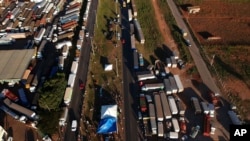A truckers protest over diesel prices that has crippled key sectors of Latin America's biggest economy dragged into Friday night, putting drivers in a standoff with Brazilian President Michel Temer who authorized military force to clear highways.
The protest will stretch into its sixth day on Saturday.
South America's largest city and economic hub Sao Paulo decreed a state of emergency, as did Rio de Janeiro.
Gas stations and airports across the nation ran out of fuel, supermarket shelves went bare and hospitals said they were running out of supplies. Public transport and trash collection was reduced or halted across the country, and many schools canceled classes as teachers could not get to work.
Lack of feed supplies may cause one billion birds and 20 million hogs to die, Brazilian meat group ABPA said.
“Those blocking the highways and acting in a radical manner are hurting the population,” Temer said in a televised address. “We will not allow hospitals to run out of supplies to save lives. We will not allow children to be harmed by the closure of schools.”
Yet Friday night, much of the country remained paralyzed.
In response to the threat of military action, Abcam, a Brazilian truckers association that says it represents 600,000 drivers, called on them to no longer block roads.
However, it encouraged the drivers to keep protesting and not deliver goods, meaning it was likely the situation would remain critical.
Accord, little action
Negotiators for several trucker groups agreed late on Thursday to suspend their blockages for 15 days after the government vowed to subsidize and stabilize diesel prices, which may cost 5 billion reais ($1.4 billion) this year.
To win over truckers the government promised to extend for 30 days a 10-percent diesel price cut announced by state-led oil company Petroleo Brasileiro SA.
Shares of Petrobras, as the company is known, closed down nearly 1.4 percent on Friday after plunging 19 percent in the prior two days, as the blockades continued.
But the Abcam trucking association that ignited the strike was not among the parties that signed the accord and insisted on Friday it would not do so until Congress puts diesel tax cuts into law, which would take several days at the quickest.
No trucks were able to enter the port of Santos, Latin America's largest, and oilseeds crushing group Abiove told Reuters that soy exports would halt on Saturday if truckers did not allow access to major ports.
Meat group ABPA said 152 poultry and pork processing plants had indefinitely suspended production.
Auto production in Brazil, which contributes about a quarter of industrial output, ground to a halt on Friday in the latest blow to a fragile economic recovery following the worst downturn in decades.








